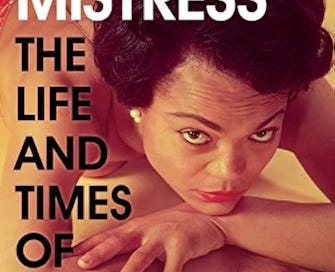John L. Williams’ America’s Mistress: The Life and Times of Eartha Kitt is a searing, unsettling, and deeply evocative biography of one of the most enigmatic figures of the 20th century.
Eartha Kitt was a woman who refused to be defined by the narrow expectations imposed on her—by race, gender, or class. A performer, polyglot, and cultural provocateur, she was a force of nature wrapped in a slender frame, a woman whose very existence was an act of defiance.
Williams masterfully captures the contradictions that made Kitt so compelling. She was a bit haughty yet deeply vulnerable, a woman who exuded an otherworldly confidence while grappling with a deep-seated longing for belonging.
Born into poverty in South Carolina, she clawed her way out through sheer talent and willpower, seducing white America at a time when women of color were rarely afforded such power. Orson Welles famously called her “the most exciting woman in the world,” and for a time, she held America in her thrall.
But that love was conditional, and when she dared to challenge the establishment—most famously with her fiery denunciation of the Vietnam War at a White House luncheon—she was swiftly discarded.
Kitt’s story resonates deeply in our current era, where we are once again grappling with the fragility of social acceptance, the fickleness of fame, and the price of speaking truth to power. Reading this book, I was struck by how relevant her journey remains.
As someone drawn to figures who live on the margins of convention—rebels, nomads, contrarians—I found myself both awed and unsettled by Kitt’s life. She moved through the world with an aristocratic air, an aloofness that kept even her closest friends at arm’s length. And yet, beneath that carefully curated persona lay a woman desperately seeking love, stability, and a true sense of home.
Williams paints a vivid picture of Kitt’s golden years in the 1950s and early 60s, when she was an international sensation, performing in multiple languages and mingling with icons like Marilyn Monroe and Albert Einstein. But he also does not shy away from her decline in the years following the White House scandal.
What I found frustrating, however, was the book’s rushed treatment of her later years. After being blacklisted in America, Kitt rebuilt her career in Europe, eventually returning to the U.S. in the 1970s. She recorded albums, wrote books, and continued to perform until her final days. Yet Williams condenses the last four decades of her life into a mere handful of pages, leaving us with an incomplete picture of her ultimate redemption.
Still, America’s Mistress is a vital and necessary read. It challenges us to consider the price of being a trailblazer, especially as a black woman in a world that is quick to embrace but even quicker to discard. Kitt’s story is a reminder that acceptance is often a transactional arrangement, and the moment one ceases to entertain or conform, that acceptance can be revoked.
What attracted me to Kitt was not just her beauty or talent, but her sheer audacity. She lived as she pleased, loved whom she pleased, and refused to be categorized. She was a global citizen long before it was fashionable, a woman who thrived in exile yet longed for home. In an era where authenticity is often just another performance, Kitt’s relentless self-invention feels both inspiring and tragic.
In the end, America’s Mistress is a book about more than just Eartha Kitt—it is about race, power, and the uneasy relationship between black artists and the American dream. It is about the way society alternates between fetishizing and punishing black women who dare to exist on their own terms. And it is about the loneliness of those who refuse to compromise.
Eartha Kitt was never just an entertainer—she was a movement unto herself. And as this book reminds us, movements are rarely allowed to rest.
Would you be kind enough to consider joining as a paid member supporter. Or feel free to tip me some coffeehouse love here if you feel so inclined.
Your contributions are appreciated!
Every bit counts as I strive to deliver high quality feature articles into your inbox on a regular basis. Never any paywalls, just the opportunity to foster community, connection, and conversation one book at a time.






